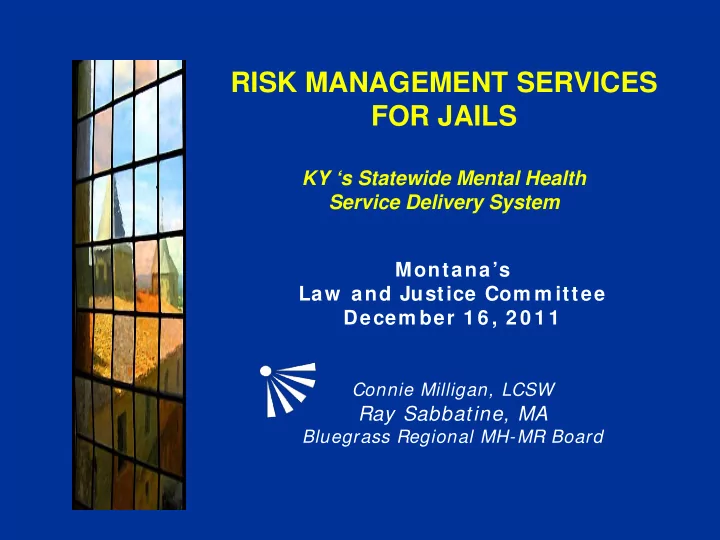

RISK MANAGEMENT SERVICES FOR JAILS KY ‘s Statewide Mental Health Service Delivery System Montana’s Law and Justice Com m ittee Decem ber 1 6 , 2 0 1 1 Connie Milligan, LCSW Ray Sabbatine, MA Bluegrass Regional MH-MR Board
Model of Partnership… Handshake between Jails and Mental Health • Using technology to connect Mental Health providers to Jails • Goal – reduce MH risk and negative outcomes • Offers a state wide solution • Successfully implemented in KY for 7 years • Funded through an increase in court cost = free service for Jails
Jail Mental Health Crisis Network Triage Level Follow Up Identify Risk of Crisis Charge Critical Counseling Police Assessment Substance Abuse Diversion Booking High Screening Telephonic/ Risk F2F/Tele/Video Suicide Follow-up Video Triage Assessment Institutional Hospital Moderate Alert Mental Illness Jail Observation Medical Low Mental Retardation Request ER ABI
Police Screening I nstrument Assessment Need: •Medical •Mental health •Suicide •Risk related to the charge
I dentification: Booking Screening Assessment • Medical • Mental health • Suicide • Substance abuse • ABI • MR • Risk related to charge
I nstitutional Alert Files
TRIAGE FORM Clinical Assessment Tool Template for Cross Training
Triage Domains Risk Assessment Levels Charge Related Risk Critical Substance Abuse Suicide Risk High Mental Health Symptoms Depression Mania Moderate Psychosis Personality Disorder Low MR/ABI/Hx of Tx
Jail Risk Management Protocols Responsibility of the Jail, based upon risk level CRITICAL HIGH MODERATE LOW Options HOUSING Restraint Single Safe General General Chair Cell Population Population OBSERVATION Constant Frequent and Individualized Normal Staggered PROPERTY None None or Full Full suicide blanket DRESS Regular Suicide Jump Suit Jump Suit Smock FOOD Finger Finger Regular Regular
Follow Up Risk Assessment Consultation by Licensed Mental Health Professionals
Sharing Information HIPAA – not an issue
Getting the Triage Information Triage information is transferred electronically by email or fax Goes to all identified addresses “Adobe Reader” displays the form It is automatically emailed to the Clinical Follow up staff when follow up is indicated Triage is printed and put in arrestee’s file Clinical follow up information is added via web, attached to initial Triage and resent
Follow Up CMHC Services CMHC will be called when consultation is indicated for acute symptoms Definition of consultation defined Evaluation Crisis Counseling Assess need for hospitalization, medication, diversion Response times are tied to level of risk Critical – 3 hours High – 12 hours Moderate – Next business day or as needed
Impact Of Program Reduced Rate of suicide in KY Jails by 84% since 2004 Statewide network and data information Centralized training and information for 83 jails & MH offices Cross training of Jail and MH staff Reduces the gap between service providers Expedited networking – information flows from jail to MH agency to court to hospitals Increased accountability = reduced risk
Recommendations for MT Centralize it with a designated 800 line and staff Find staff or CMHC to provide follow up – can be telephonic, video or F2F Connect to Jails via telephone – send information via web or fax Training manuals and PP provide details Conduct regional trainings Have all parties sign a MOU or BAA Start with pilot in one region
Implementation Expenses KY Model – Branded for MT Software –Run through BG cloud for maintenance and tech support Protocols and training materials Training and consultation in a train the trainer model Central location with an 800 line Staff – three to start to run the program and do Triage Cell phones and laptops for after-hours work Clinical Follow up staff – done centrally or regionally Regional training for Jail and MH staff
Recommend
More recommend